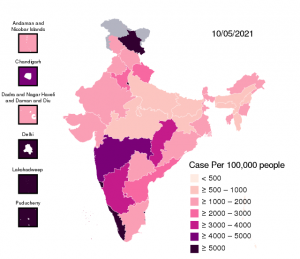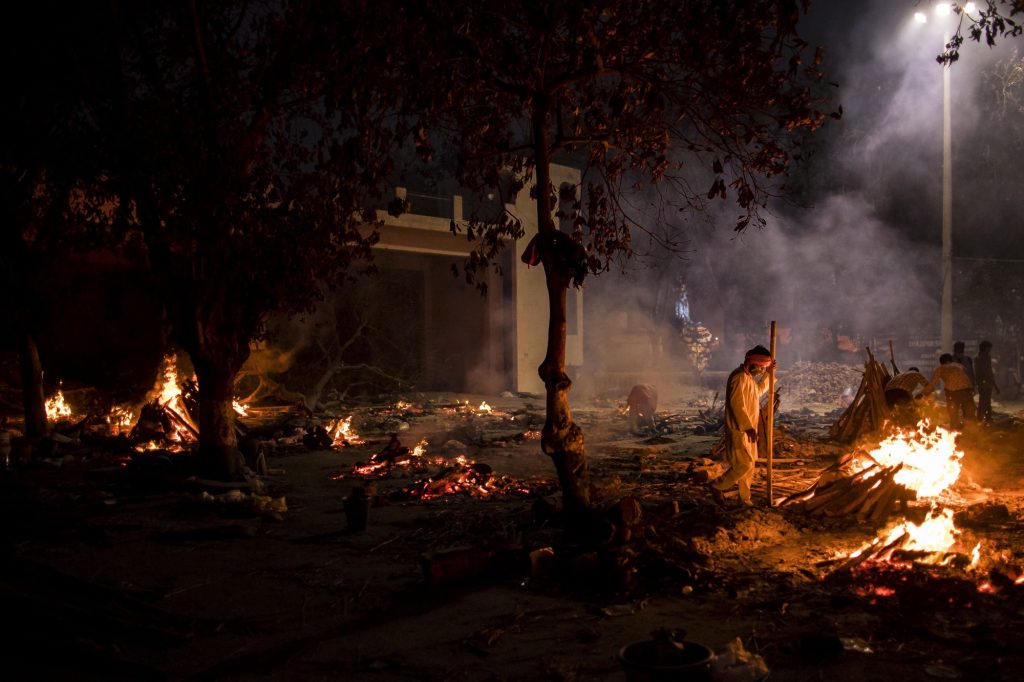By guest contributor, Ayush Kumar is a law student at Dr. Ram Manohar Lohiya National Law University, India.
On the 13th of March, as a gesture of accountability, Jordan’s health minister resigned after six Covid-19 patients died due to lack of oxygen at a hospital ward. Accountability is the linchpin of a
functional democracy as it compels a State to explain what it is doing and how it is moving forward in times of crisis. In the past few weeks, India has faced a massive oxygen shortage as the healthcare infrastructure collapsed like a house of cards due to exponentially rising cases of Covid-19. Alone in the capital city, twenty-five patients died due to the shortage of oxygen on 24th April.
The government’s inadequacy in providing healthcare facilities to its people is a serious violation of their human right to health. Patna High Court’s division bench expressed strong displeasure over the deaths due to oxygen shortage and further stated that lack of adequate healthcare, especially in the middle of a pandemic, violates citizens’ right to life under Article 21 of the Indian Constitution.
WHAT DO THE JUDICIAL PRECEDENTS SAY?

The jurisprudence around the right to health started to take shape in India after 1988 when the Supreme Court of India, in the case of Rakesh Chandra Narayan v State Of Bihar, recognised a welfare state’s legal obligation to provide medical attention to every citizen. The Directive Principles of State Policy in Part IV of the Indian Constitution also provide a basis for the right to health. As Article 47 states:
“The State shall regard the raising of the level of nutrition and the standard of living of its people and the improvement of public health as among its primary duties and, in particular, the State shall endeavor to bring about prohibition of the consumption except for medicinal purposes of intoxicating drinks and of drugs which are injurious to health.”
Further, in the case of Bandhua Mukti Morcha v. Union Of India & Others, the court held that “the right to live with human dignity enshrined in Article 21 derives its life breath from the Directive Principles of State Policy. Therefore, it must include protection of the health.” The problem with Directive Principles of state policy is that they are non-justiciable. Article 37 clearly iterates the same. However, the Supreme Court has mentioned in Akhil Bharatiya Soshit Karmachari Sangh v. Union Of India And Ors that even though Directive Principles are non-enforceable, that does not mean that they are less important than Fundamental Rights or that they are not binding on the various organs of the State. The court said that these principles should act as a guiding light when drafting new legislation for the public.
 In the famous case of Navtej Singh Johar v. Union Of India Ministry Of Law where the court decriminalised homosexual intercourse, Justice D. Y. Chnadrachud remarked:
In the famous case of Navtej Singh Johar v. Union Of India Ministry Of Law where the court decriminalised homosexual intercourse, Justice D. Y. Chnadrachud remarked:
“Article 21 does not impose upon the State only negative obligations not to act in such a way as to interfere with the right to health. This Court also has the power to impose positive obligations upon the State to take measures to provide adequate resources or access to treatment facilities to secure effective enjoyment of the right to health.”
Moreover, in the case of Paschim Banga Khet Mazdoorsamity v. State Of West Bengal & Anr, the Supreme Court of India opined that failure on the part of a government to provide timely medical treatment to a person in need results in a violation of his right to life guaranteed under Article 21. The court further stated that the government should ensure the availability of beds in the hospital in an emergency. There is a tacit constitutional obligation upon the government to ensure that no person succumbs to death due to lack of oxygen or other indispensable medical facilities.
Considering international laws, Article 12 of the International Covenant on Economic, Social, and Cultural Rights (1966), to which India is a party, recognises the right to health for the first time. The Covenant stated four paramount steps that the parties should take to achieve the full realization of the right. These steps included the prevention, treatment, and control of epidemic, endemic, occupational and other diseases and the creation of conditions that would assure all medical service and medical attention in the event of sickness.
GOVERNMENT’S CARELESSNESS AND THE SECOND WAVE
The Indian government has its priority set straight, controlling the pandemic is not its main agenda. While people were gasping for oxygen across the country, the Indian Prime Minister, on 17th April, was holding large rallies in West Bengal without a mask mandate, for assembly elections which they eventually lost. On that particular day, India recorded 261,394 new Covid-19 cases. Surprisingly, the election in Bengal was the longest assembly election so far spread into eight phases. Going against TMC’s suggestion to combine the phases, BJP urged the Election Commission to stick to the decided schedule despite mushrooming cases of Covid-19. The Madras High Court rebuked the Election Commission for the way it functioned in the middle of a pandemic. The court said that EC was solely responsible for the second wave of Covid-19. Furthermore, the court also said that EC’s officers should be booked under murder charges.
The government of India has functioned counter to all the laws and international treaties. There is an acute shortage of medical equipment in the country in which patients are forced to share their beds and oxygen cylinders. Social media networks have become a public helpline platform where people are begging for information on the availability of beds, oxygen cylinders, Remdesivir, and testing facilities. Chief Minister of India’s most populated state ascertained that there was no shortage of oxygen in the state and asked officials to take action under the National Security Act and seize the property of individuals who spread “rumors” on social media.
Moreover, cremation grounds are witnessing an unprecedented rush of dead bodies daily. People are waiting up to eight hours in line to get their family members cremated with no dignity whatsoever. Notably, in the case of Pt. Parmanand Katara, Advocate v. Union of India & Anr., it was held by the Supreme Court that the Right to Dignity is available not only to a living man but also to his body after his death.

Additionally, there have been serious allegations on the government of tampering with the official death count as people who are on the ground claim that the number of dead bodies that arrive at a crematory is way more than the official count. A group of volunteers from Kerala trawled local papers and news networks for reports on deaths due to Covid-19. The volunteers had counted 3,356 deaths from the infection in Kerala, but the official death toll from the disease is 1,969.
America’s top public health expert, Dr. Anthony Fauci, advised India to lock down the country and boost up the inoculation process. Recently, the Indian Medical Association also demanded a nationwide lockdown. Clearly, all the warnings and suggestions fall on deaf ears. A fundamental welfare state is more invested in dodging the economic bullet that a national lockdown would entail rather than breaking the transmission chain and stopping Covid-19 from further wreaking havoc on the population.
Photos
Altaf Qadri / Associated Press
“Fight Against COVID-19 @ Jangamakote Village” by Trinity Care Foundation is licensed under CC BY-NC-ND 2.0
Map of cumulative COVID-19 cases in India by states and UT. Data source: MoHFW.
Anindito Mukherjee / Getty Images
